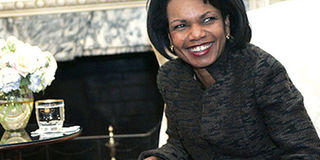I cherish public service because of Condoleezza

US Secretary of State Condoleezza Rice reacts to a reporters question regarding who the new Secretary of State will be, at the State Department in Washington . PHOTO/REUTERS
What you need to know:
- She received her PhD in political science at the age of 26
- She headed a university at the age of 30
As a 16-year-old lad, I often took a keen interest in politics and governance.
This was the period around when Prof Wangari Maathai won the Nobel Peace Prize in 2004. I proudly watched on television as the Kenya national anthem was played in Oslo, Norway, and international dignitaries such as the billionaire American talk show host Oprah Winfrey were introduced to Prof Maathai.
I was fascinated by the glory that followed the former Tetu MP everywhere she went. US President Bill Clinton wrote the foreword on her autobiography, Unbowed; One Woman’s Story. The fascination grew to a strategy: I, too, wanted to get my own Nobel Peace Prize soon. I wanted to be globally celebrated, too.
As I grew older, however, I realised what a herculean task it would be. I was interested in the glory, but did not quite know the story that gradually contributed to the glory.
All through high school, I was fascinated by the glory that came from wielding power. I never missed Time magazine’s annual list of the world’s most powerful 100, or Ebony magazine’s annual version of the 100 most powerful people of African descent. Through the magazines, I came to a realisation that one person stood out as either the ‘Most Powerful Woman in the World’ or ‘World’s Most Powerful Black Woman’. That person was Condoleezza Rice.
SHE WORKED HARD
Being the first female, African-American provost of a major American University (Stanford), first female and first African-American national security advisor, and the first female African-American secretary of State did not come to her by luck. She worked hard. Having received her PhD in political science at the age of 26 and headed a university at the age of 30, her future definitely was guaranteed.
I was deeply fascinated by how she carried herself, particularly when she was overseas representing the world’s most powerful nation as its chief diplomat. When she wrote her memoirs No Higher Honour – A Memoir of my Years in Washington in 2011, three years after her term ended as secretary of State, I quickly bought a copy.
Beneath the surface of grandeur, calmness and authority that she exhibited to the public, she says that much authority has to be in tandem with equal responsibility. Maybe that is the reason she has always remained adamant that she will never seek the American presidency despite always being prodded to run.
WIELDING AUTHORITY
My dream career is to work in the public sector either as an elected official or a senior advisor to the president. Lately, the latter seems more attractive since it does not invite much media attention.
Earlier on, what made those occupations seem attractive was the speculation that it had streams of opulence and easy wielding of authority. That has definitely dwindled by information and mental growth such that if I want to be excellent in public service, I have to be thoroughly knowledgeable and informed. Also, as the country takes on a different path when it comes to accountability, those who seek appointive offices have to either have polished academic credentials or exhibit a certain demeanour of intelligentsia.
What struck me most was her academic credentials: A PhD at 26 in the 1970s, at the height of the civil rights movement and despite being female and black. She had to overcome sexism and racism all at once.
Her birthplace, too, is ironical of her achievements — Birmingham, Alabama, in the South, where racial segregation was supreme and blacks were treated as sub-humans, thanks to the Jim Crow laws.




